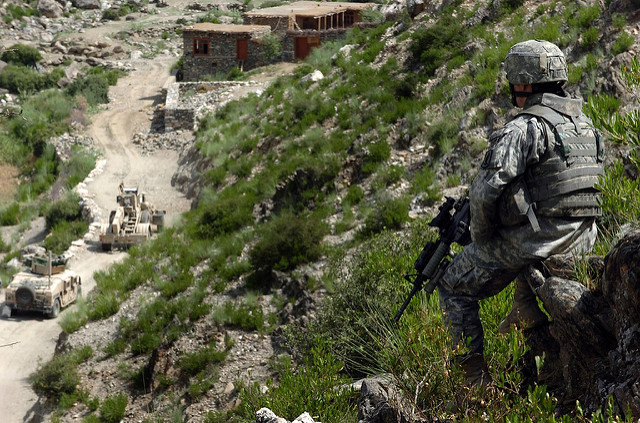
A quarterly report published on Tuesday detailed tumult in Afghanistan, amid uncertainty over the Trump administration’s approach to America’s longest-running war.
Afghan security forces suffered thousands of casualties in the first few months of this year, according to the Special Inspector General for Afghanistan Reconstruction (SIGAR). Between January and May, 2,531 were killed and another 4,238 were wounded in action.
Although Afghan forces suffered roughly the same number of casualties in the same time frame in 2016, this year’s number involved fewer losses from “planned offensive operations,” SIGAR noted. The struggle for control between the Taliban and government forces remains largely unchanged, with 119 national districts contested.
The report comes days after The Wall Street Journal revealed that the White House is considering replacing the 8,500-strong US contingent in Afghanistan with private contractors.
President Trump had previously been weighing the deployment of an additional 3,000-4,000 personnel to Afghanistan. The White House had been pushing the Pentagon to rely more heavily on private contractors after military officials called for the additional troops, according to The New York Times.
The US military is in Afghanistan in an “advise and assist” capacity. Congress has allocated $714 billion to the war since it started in 2001.
Although similar Afghan casualty rates in late 2014 led a senior US military official to declare that the trend was “not sustainable,” Afghan forces are growing in size. The latest figures available show that the country’s police and military added more than 16,000 members in the previous year, to swell overall personnel numbers to 336,042.
That figure does, however, include “ghost” soldiers — phony servicemembers registered so someone can draw their salary. According to SIGAR, there are 12,703 staffers within the Ministry of Defense, or 7 percent of the body’s entire payroll, who are “unaccounted for.”
Corruption is also rampant in other regards. Tuesday’s report detailed zero progress, in recent months, in efforts to recover the nearly $1 billion that was stolen from Kabul Bank; a theft that led to the institution’s collapse, in 2010.
“Some debtors appear to be shielded by their close ties to former and current high-level government officials,” SIGAR noted.
The report mentioned Abdul Ghafar Dawi, a former bank shareholder and oil executive, who was arrested earlier in the year, accused of embezzling millions of dollars. “Dawi was freed this quarter without repercussion,” SIGAR said.
In September 2014, Afghan President Ashraf Ghani ordered the recovery of money stolen from Kabul Bank. Since then, only $32.6 million in additional cash has been recovered.
Money that remains hidden includes hundreds of millions of dollars connected to Kabul Bank’s former CEO, Khalilullah Ferozi, and its ex-chair, Sherkhan Farnood. “Their assets are hidden under other people’s names,” SIGAR said, citing input from the Justice Department. Ferozi is only required to serve his prison sentence at night.
Some of the money stolen from Kabul Bank might be in the US. The Afghan government had asked DOJ for assistance in April 2015, but the request was considered “legally deficient” by US officials.
Justice “outlined the corrective actions needed to move forward,” SIGAR noted, but the Afghans were unresponsive “and the case was closed this quarter.
Angry, shocked, overwhelmed? Take action: Support independent media.
We’ve borne witness to a chaotic first few months in Trump’s presidency.
Over the last months, each executive order has delivered shock and bewilderment — a core part of a strategy to make the right-wing turn feel inevitable and overwhelming. But, as organizer Sandra Avalos implored us to remember in Truthout last November, “Together, we are more powerful than Trump.”
Indeed, the Trump administration is pushing through executive orders, but — as we’ve reported at Truthout — many are in legal limbo and face court challenges from unions and civil rights groups. Efforts to quash anti-racist teaching and DEI programs are stalled by education faculty, staff, and students refusing to comply. And communities across the country are coming together to raise the alarm on ICE raids, inform neighbors of their civil rights, and protect each other in moving shows of solidarity.
It will be a long fight ahead. And as nonprofit movement media, Truthout plans to be there documenting and uplifting resistance.
As we undertake this life-sustaining work, we appeal for your support. Please, if you find value in what we do, join our community of sustainers by making a monthly or one-time gift.